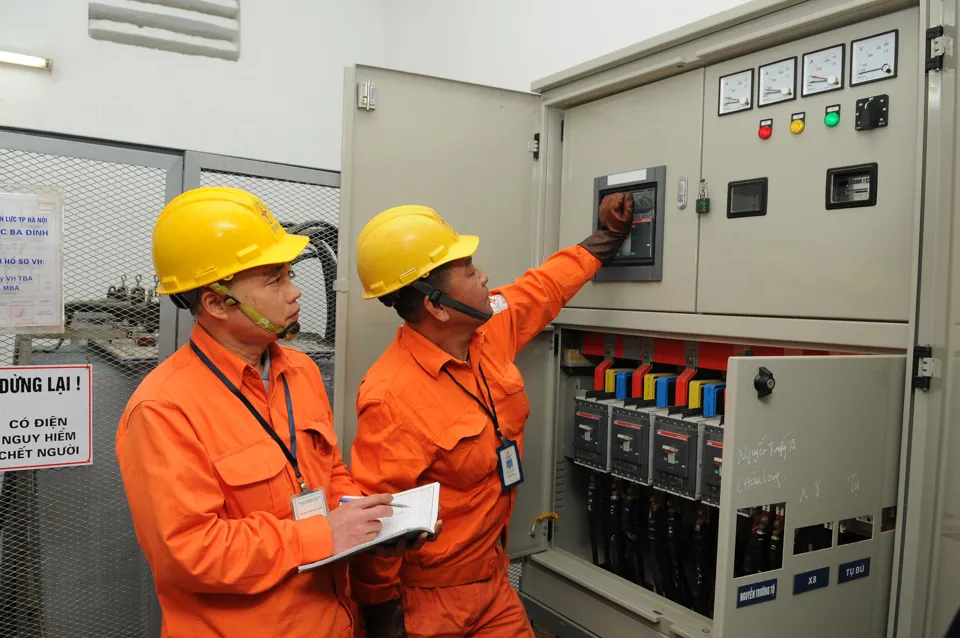Vietnam allows direct solar and biomass power sales, bypassing EVN
A survey by the Ministry of Industry and Trade late last year showed that around 20 large enterprises wish to buy electricity directly, with a total demand of nearly 1,000 MW.
The Vietnamese Government has announced a decision to authorize rooftop solar, biomass, and waste-to-energy projects to engage in direct power sales, bypassing the Electricity of Vietnam (EVN).
| EVN Hanoi's workers check a power station grid. Photo: Thanh Hai/The Hanoi Times |
This provision is detailed in the Government's Decree on the direct power purchase agreement (DPPA) mechanism between renewable energy producers and large electricity consumers, dated July 3.
The Decree provides for direct electricity sales through two ways: via private power lines and through the national grid (involving EVN).
Under the private line method, eligible renewable energy producers include those generating solar, wind, small hydropower, biomass, geothermal, ocean wave, tidal, marine current, and rooftop solar power. No capacity limits apply to these projects, but they must have an electricity operating license or be exempt from such requirements under the regulations.
However, this mechanism does not include waste-to-energy as it is not clearly categorized as renewable energy, according to the Ministry of Industry and Trade (MoIT). It might be added if authorities approve its inclusion.
For sales over private lines, renewable energy producers and large consumers will enter into a purchase agreement, with mutually agreed terms and prices. Excess electricity can be sold back to EVN through a purchase contract specifying capacity, volume, and price.
As well as buying directly from renewable energy producers, consumers can also purchase electricity from EVN or other retail electricity providers. Currently, there are over 103,000 rooftop solar projects nationwide with a total installed capacity of more than 9,500 MW. According to the Power Development Plan (PDP) VIII, this capacity is expected to increase by 2,600 MW by 2030, covering 50% of public and residential buildings.
Allowing rooftop solar projects to engage in direct power sales addresses the challenges faced by this energy type and supports the MoIT’s policy of encouraging self-production and self-consumption.
Additionally, the Decree stipulates that wind and solar projects must have a capacity of over 10 MW to engage in direct power sales through the national grid.
For sales via the national grid, the Decree specifies that renewable energy producers must participate in the spot market (wholesale market known as a spot market because prices are set on the spot, at a particular time and place) and enter into transactions with EVN.
In both cases, buyers are organizations or individuals using electricity for production at a voltage level of 22 kV or higher, with an average monthly consumption of at least 200,000 kWh, lower than the previously proposed 500,000 kWh.
According to surveys by electricity companies, about 30% of large customers use over 500,000 kWh, while over 7,700 customers, or 36.5% of total electricity consumption, use over 200,000 kWh.
Retail electricity units in industrial, economic, and export processing zones must be licensed to sell electricity and have a minimal monthly off-take of at least 200,000 kWh at a voltage level of 22 kV.
The DPPA mechanism has been repeatedly requested by foreign-invested enterprises, as they believe it would increase competition in the energy sector.
The MoIT first proposed a DPPA pilot nearly three years ago with an initial capacity of 1,000 MW, attracting interest from large corporations like Samsung.
A survey by the Ministry late last year indicated that around 20 large enterprises wish to buy electricity directly, with a total demand of nearly 1,000 MW. Additionally, 24 renewable energy projects with a capacity of 1,773 MW want to sell electricity through the DPPA mechanism, and 17 projects with a capacity of 2,836 MW are considering participation.












